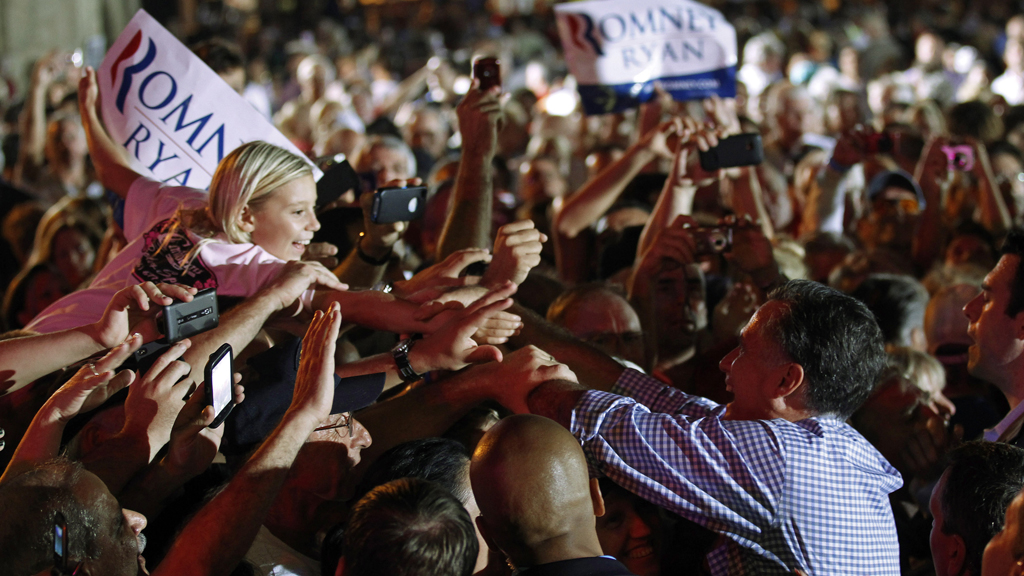A dead heat, as Obama and Romney face final debate
The polls could hardly be tighter, and Monday’s final presidential debate could hardly be more crucial. Can Romney keep up his surge of momentum – or will Obama show what he is made of?

They have put up the lights and built the stage: kitted out special dressing rooms and issued more than three thousand press passes. Even the humidity levels have been checked. A university campus in Florida’s Boca Raton will suddenly become the focus of the world’s press on Monday night: this is where Barack Obama will face Mitt Romney in a debate which could decide their political futures.
This third and final clash is meant to be all about foreign policy, but you can bet both men will be vying to score points on a host of other issues from the economy to women’s issues. It is just too close for anything less.
In the final weeks of this long and exhausting election campaign, the polls are showing the thinnest of margins between the two men. RCP’s national average gives Obama a 0.1 per cent lead, with Romney gaining ground in several of the most important battleground states.
Florida is a case in point: the Republican has made bigger than average gains over the last couple of weeks. He is now comfortably ahead in four polls and is the clear favourite to win. Obama’s slipping leads in Ohio (down to just one point, according to one survey) and Wisconsin are deeply worrying for his team.
Winning the early vote
The GOP have been claiming success in Ohio’s early voting, spokesman Tim Miller declaring that the Democratic lead there is “collapsing”. The statistics they have been quoting do not mean much at this stage, but both campaigns are working flat out to notch up as much guaranteed support as they can.
Bill Clinton, Vice-President Biden, and Bruce Springsteen have all stumped for Obama in Ohio and Iowa, while the DNC communications director in North Carolina, where early voting has just started, reminded supporters that the party’s advantage in 2008 helped propel Obama to victory in 2008.
Inevitably, perhaps, the money race is just as critical. Financial returns filed this week show a surge in donations for both candidates: $181m for Obama in September, $170m for Romney. But the vast majority of spending has been on the Democratic side.
Obama has spent almost $300m in a relentless advertising push, helped in part by the fact that his official campaign committee, Obama for America, has received far more direct small donations, which means fewer restrictions on how that cash can be spent.
Spurred, perhaps, by fears that the contest is all getting way too close for comfort, the Democrats‘ big donors have finally got out their chequebooks, giving the Obama supporting superPAC Priorities USA Action its best fundraising month yet.
If it is star power you are after, then fashion designer Tom Ford and the singer Gwen Stefani are listed among the president’s bundlers, pulling in more than half a million dollars.
The big guns on the Republican side, however, have been channeling six and even seven figure sums in to groups backing Mitt Romney. Their tactic has been to wait until these last crucial weeks before launching a massive advertising blitz across the key states.
Little wonder, then, as the Associated Press reports, that voters inundated with calls are starting to block numbers from the campaigns. One woman counted four political calls in five minutes: although party activists claim it hasn’t nearly reached saturation point, not nearly yet.
Intense preparation
As for the candidates themselves, they have taken precious hours off the campaign trail to prepare for that final debate: one of their final opportunities to capture voters’ attention, while tens of millions are watching.
There are clear pitfalls for both men. Romney has shown that foreign policy is hardly his strong point, even though he has a whole list of issues to bash Obama, from the Middle East to the terror attack in Benghazi, his lack of experience has consistently overshadowed everything he says.
As for Obama, there is another fine line to calibrate: defending his record, while articulating that vision for the next four years which was signally lacking in the first two debates. And then there is the tone: avoiding the lacklustre torpor of he first debate, without being as agressive as the second.
After the disaster of that first encounter, pundits wondered whether Obama even wanted to fight for his job. This week, he is out to prove he does, with what is described as a non-stop tour of six battleground states, starting straight after the Florida debate.
First stop Iowa, then Colorado, Nevada, Florida again, Virginia and Ohio. In between stops, he will be making calls to undecided voters from on board Air Force One – an exhausting schedule, which reveals just how much is at stake.
After that, back home to Chicago, where Obama will become the first sitting president in history to vote early, in person. With the polls literally showing a dead heat, it seems nothing can be left to chance.
Felicity Spector writes about US politics for Channel 4 News